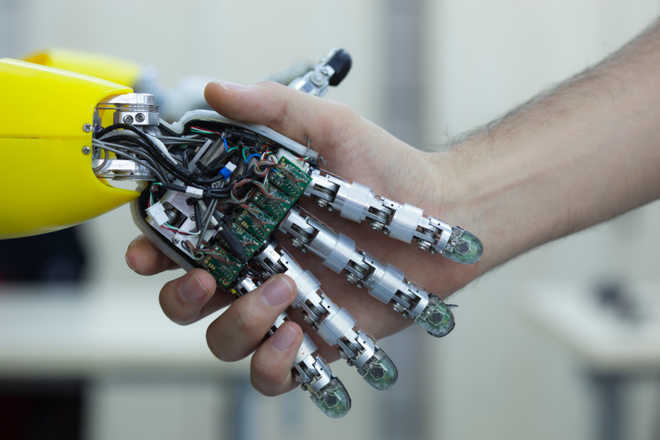BERLIN
Scientists have developed a system combining artificial skin with control algorithms, and used it to create the first autonomous humanoid robot with full-body artificial skin.
Sensitive synthetic skin enables robots to sense their own bodies and surroundings—a crucial capability if they are to be in close contact with people.
The artificial skin developed by Gordon Cheng and his team at the Technical University of Munich (TUM) in Germany consists of hexagonal cells about one inch in diameter.
Each is equipped with a microprocessor and sensors to detect contact, acceleration, proximity and temperature, according to the research published in the journal Proceedings of the IEEE.
Such artificial skin enables robots to perceive their surroundings in much greater detail and with more sensitivity.
This not only helps them to move safely. It also makes them safer when operating near people and gives them the ability to anticipate and actively avoid accidents, the researchers said.
The skin cells themselves were developed around 10 years ago by Cheng, Professor of Cognitive Systems at TUM.
However, this invention only revealed its full potential when integrated into a sophisticated system.
The biggest obstacle in developing robot skin has always been computing capacity. Human skin has around five million receptors.
Efforts to implement continuous processing of data from sensors in artificial skin soon run up against limits, according to the researchers.
Previous systems were quickly overloaded with data from just a few hundred sensors.
To overcome this problem, Cheng and his team do not monitor the skin cells continuously, but rather with an event-based system.
This reduces the processing effort by up to 90 per cent.
The individual cells transmit information from their sensors only when values are changed. This is similar to the way the human nervous system works.
For example, we feel a hat when we first put it on, but we quickly get used to the sensation, the researchers said.
With the event-based approach, Cheng and his team have now succeeded in applying artificial skin to a human-size autonomous robot not dependent on any external computation.
The H-1 robot is equipped with 1260 cells (with more than 13000 sensors) on its upper body, arms, legs and even the soles of its feet.
This gives it a new "bodily sensation," the researchers said.
For example, with its sensitive feet, H-1 is able to respond to uneven floor surfaces and even balance on one leg. With its special skin, the H-1 can even give a person a hug safely, they said.
"This might not be as important in industrial applications, but in areas such as nursing care, robots must be designed for very close contact with people," said Cheng. — PTI
Unlock Exclusive Insights with The Tribune Premium
Take your experience further with Premium access.
Thought-provoking Opinions, Expert Analysis, In-depth Insights and other Member Only Benefits
Already a Member? Sign In Now











